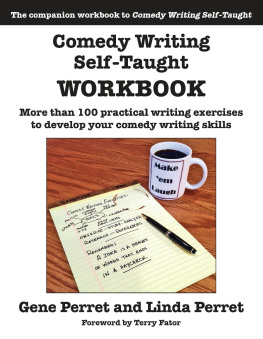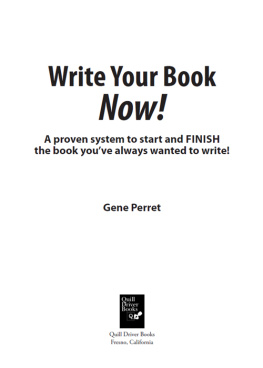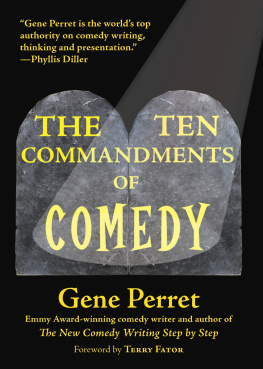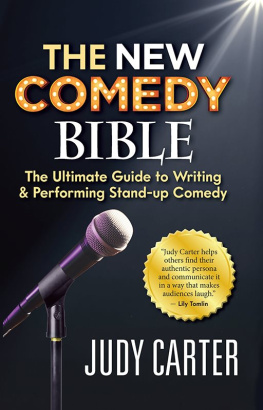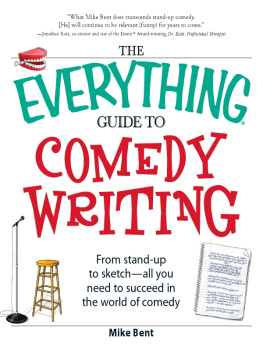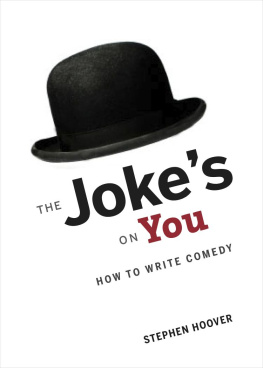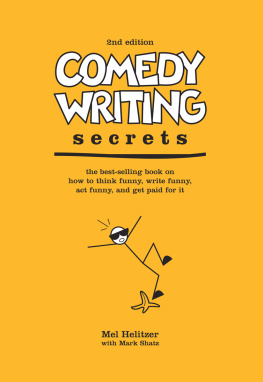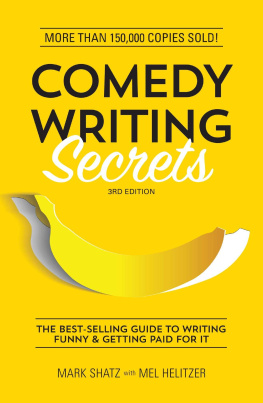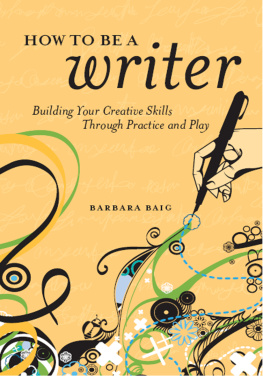Comedy Writing Self-Taught
WORKBOOK
More than 100 practical writing exercises to develop your comedy writing skills
Gene Perret and Linda Perret

Fresno, California
Comedy Writing Self-Taught Workbook
Copyright 2014 by Gene Perret and Linda Perret. All rights reserved.
Published by Quill Driver Books
An imprint of Linden Publishing
2006 South Mary Street, Fresno, California 93721
(559) 233-6633 / (800) 345-4447
QuillDriverBooks.com
Quill Driver Books and Colophon are trademarks of
Linden Publishing, Inc.
ISBN 978-1-61035-240-6
eISBN 978-1-61035-261-1
135798642
Printed in the United States of America
on acid-free paper.
Library of Congress Cataloging-in-Publication Data on file.
To the many great humorists of tomorrowyou know who you are.
Gene
To all my Round Table Friendsa great group of writers and performers.
Linda
Contents
There are no shortcuts to success. After I won Americas Got Talent in 2007, people kept describing me as an overnight success while conveniently forgetting to mention I had spent over twenty years on the road working on my ventriloquism, singing and comedy.
But trust me, I wasnt born throwing my voice. Its an ability I developed, but it took a long time. Luckily I had a master to learn from and a book he had writtenit was Paul Winchells Ventriloquism for Fun and Profit. When I was ten years old I checked it out of the library and started learning about ventriloquism. So thanks to Paul I became a ventriloquist. But thats only half the story. As I worked on my act I noticed that having the skill to throw your voice is one thing; having something funny to say is another. Luckily I found another book. I know what youre thinkingsomeone in show business actually read two books! But its true. It was by Gene Perret and it was called Comedy Writing Step By Step. I started doing the exercises, learning from the master, and added comedy to my act.
Bottom lineIm a headliner at the Mirage because I could rely on the two best teachers in the world in Paul and Gene. And Gene is still teaching. He and his daughter Linda, who is one of my writers, have come up with the one definitive guide comedy writers need, the book youre holding in your hands or reading on your Kindle, Comedy Writing Self-Taught Workbook: More than 100 Practical Writing Exercises to Develop Your Comedy Writing Skills.
This is the book you need if you are a good comedy writer who wants to get better, a novice who wants to begin, or even an established performer who wants to learn from the best. Trust me, even though Ive got a show at the Mirage, Ill be using this as a guide to improve my act and make it better and funnier.
So I hope you enjoy the book and the Perrets brilliance as much as I do. Now start reading and keep writing!
Terry Fator
Writers write. Thats what we do. As comedy writers, we generate funny material and receive a paycheck in return. Its a great system. And its what makes us professionals. But like the skills of any pro, those needed to earn that paycheck have to be honed, sharpened, and perfected. Even then, once you develop those skills, you must keep them in shape. All that comes about by writing.
Thats the purpose of this bookto present exercises that you can use to keep your comedy muscles toned and, who knows, maybe even develop a few that you didnt know you had.
Good comedy should appear spontaneous and naturalbut dont be deceived. Comedy writing is hard work. It would be terrific if you could spend an afternoon reading this book and then magically become a great professional writer. It just doesnt happen that way, darn it. You have to devote time and effort to it. You have to work at it.
The exercises in this book are challenging. Theyre designed to be. As they say in the world of physical exercise, No pain; no gain. We want you to huff and puff a little bit. We want to get you out of your comfort zone. Because out of your comfort zone is where you develop new skills. And the more you work at these unfamiliar techniques, the easier they become to you.
Comedy writing is fun, but it has its headaches at times. As a professional writer, you will be asked to supply material quickly, on topics you may not be familiar with and sometimes under less than desirable circumstances. Now is the time to prepare for that sort of pressure. After completing the exercises in this book, youll be ready to face these situations. Youve already conquered the tough challenges here, so you know you can do it.
A pro golfer doesnt just walk out to the tee and hit the ball a ton. Oh sure, it may look that way on TV. But that golfer has practiced. Hes spent years going to the driving range, studying the courses, and playing the practice rounds. Now when he steps up to tee off, he knows he can hit the ball, because he has already done it thousands of times before.
Another purpose of these workouts is to expose you to different kinds of writing. You may want to write sitcoms and thats great. But working on one-liners can help sharpen your joke writing skills that can be used in dialogue.
Sticking with our sports analogy, lets look at boxers. What are they known for? Getting into a ring and pummeling their opponent. Thats what they do and then they collect their paycheck. But when they train, they dont just box, they also work out on the bag to build up hand speed. They jump rope to improve their footwork. They run to build up stamina. In other words, they train to improve the overall package. So when they step into the ring, its easier for them to pummel the opponent, collect the check, and go home.
Thats what these exercises are designed to do for youmake you a well-rounded comedy writer who can take on any opponent.
Well admit that many of the exercises in this volume are not typical assignments that would be handed to you in the comedy writing profession. Yet they serve a purpose. These drills prepare you for the rigors of the writing life. The boxer doesnt skip rope during the fight, but hes often glad he did it before the bout. Hes glad it was part of his training. These exercises are part of your training. Even though some may not seem relevant to the normal comedy writing workday, if you can commit to them and give them the dedication they deserve, theyll serve you well throughout your career.
The main purpose of this book, though, is to get you to write. Author, Hugh Prather once said, If the desire to write is not accompanied by actual writing, then the desire is not to write. We want you to write... and write... and write.
The club where we sometimes play golf has four practice areas just outside the clubhouse. These are not places where you play the game. Theyre reserved strictly for golfers who want to do some swing exercises. But why are there four of them? Wouldnt one area set aside for drills be enough?
No, it wouldnt because there are different types of golf swings that require different practice areas. For instance, this particular club has a driving range where you can swing freely and hit the ball as far as you like. Its a place where you can experiment with the full golf swing. Theres a putting green where you can do drills to improve your putting, and only your putting. Theres a chipping area that is strictly for practicing your chipping stroke. Then there is an area for pitching and sand shots.
Which area should the golfers use? They should use whichever one they want in order to work on whichever shot they feel needs improvement. Comedy writers, too, should practice different skills. Thats why this book is divided into various practice areaseach one dedicated to a different writing genre.
Next page
